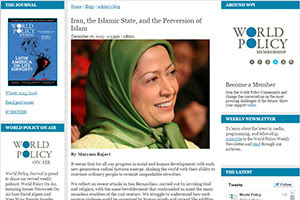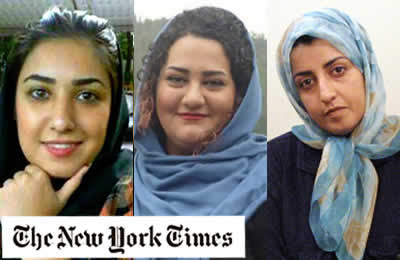 |
| Maryam Rajavi |
It seems
that for all our progress in social and human development, with each new
generation radical factions emerge, shaking the world with their ability to
convince ordinary people to commit unspeakable atrocities.
We reflect
on recent attacks in San Bernardino, carried out by invoking God and religion,
with the same bewilderment that confounded us amid the many senseless cruelties
of the 21st century. We struggle to understand how such wanton violence could
be conceived by human minds and spread like wildfire. And, of course, we set
ourselves to right it, asking how we can combat this most current version of
extremism and prevent new forms from plaguing the world.
The breed
of extremism that we face today is a lethal cocktail of medieval barbarism and
modern-day fascism. It is a worldview that shuns political tolerance, promotes
misogyny, and, of course, glorifies violence. This specific brand pursues the
implementation of Sharia and its draconian punishments. It has never had any
connections to Islam, and there is clearly no place in the modern world for
such a worldview.
However,
it is a worldview with contemporary precedent. Ever since Ruhollah Khomeini
came to power in 1979, Tehran championed itself as a successful model, which
fundamentalists could follow in order to gain stature, power, and sovereign
legitimacy. This presents a tantalizing message to Sunni extremists like the
Islamic State– why can they not create their own “Islamic” State when Shiite
fundamentalists have already done so?
While the
conceptual origins of this extremist ideology took shape in the early years of
Islam, it only turned into a formidable global force when fundamentalism
gripped Iran in the aftermath of the 1979 revolution.
The regime
that replaced the Shah—who was also detestable and undemocratic—began exporting
Islamic fundamentalism on an unprecedented scale almost overnight. High-profile
hostage-takings, bombings, suicide attacks, and assassinations became the norm
as the mullahs in Tehran began building their own version of a theocratic state.
In these
early stages, Shiite terrorist factions, including militias in Iraq, Hezbollah
in Lebanon, the Houthis in Yemen, and others were directly formed by the
Iranian regime. Without such state sponsorship from Tehran, their clout and
influence would have quickly evaporated and they would have vanished. The
vicious ideology and proliferative model grew increasingly lethal as its
proponents gained access to veritable troves of military, diplomatic,
political, and propaganda resources within the sovereign state borders of Iran.
So began
the first modern-day “caliphate”—years before al-Qaida’s first attack burned in
Yemen, and a full three decades prior to the rise of the Islamic State.
Many
assume that Sunni fundamentalism is a unique phenomenon, entirely separate from
the dogmas espoused by the Shiite mullahs in Tehran, but the differences are
ancillary. In fact, Sunni fundamentalists have found tremendous strength under
the political and spiritual umbrella of the Iranian theocracy. Both share the
same ideological building blocks: the establishment of a religious state, which
implements Sharia by force.
There is
considerable evidence that the regime in Tehran has armed and financed Sunni
extremists at various times and locations. Not only is Iran a long-standing
sponsor of Hamas, but also as U.S. Secretary of State John Kerry said recently,
“ISIS was created by Assad releasing 1,500 prisoners from jail, and Maliki
releasing 1,000 people in Iraq who were put together as a force of terror.”
Tehran is the known puppet-master of both.
In recent
years, the massacre of hundreds of thousands of Sunnis in Iraq and Syria at the
hands of the Iranian regime and its proxies has provided a wellspring of
sociopolitical sustenance for the Islamic State. Iran is propping this
extremist hydra up on all sides, and finding new and creative ways to
reinvigorate the beast as our security and intelligence missions stride in its
wake. If Iran is one of the linchpins that legitimize the global Islamic
extremist threat, what is to be done?
History
tells us that nothing is more dangerous for fundamentalism and extremism than
democratic and moderate ideals. This has been made clear in Iran, where the
regime’s suppressive tactics find their chief targets are the moderate Muslim
factions, including the Mujahedin-e Khalq (MEK).
To meet
with true success, the current military campaigns and intelligence operations
in the region must be complemented by the promotion of an interpretation of
genuine Islam that is both democratic and tolerant. Only through a nuanced but
unambiguously affirmative strategy that provides lasting moral and physical
support to the people of Iran and the region in their quest for freedom and
moderate leadership will we escape the echoes of history’s darkest narratives.
Maryam
Rajavi is the president-elect of the National Council of Resistance of Iran,
which seeks the establishment of a democratic, secular, and non-nuclear Iran.



